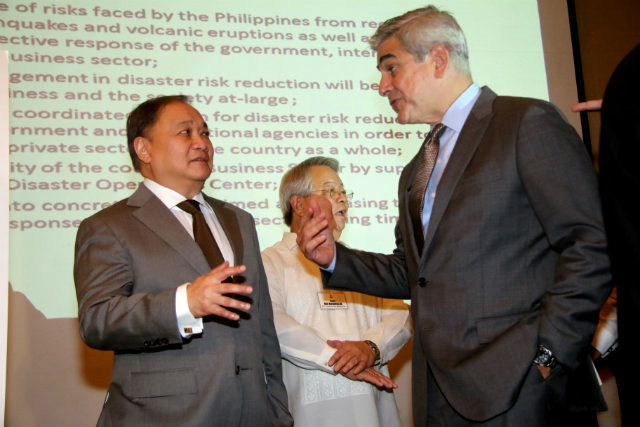It takes a disaster to bring Jaime Zobel de Ayala and Manny V. Pangilinan together in the same room.
The two heads of the country’s top conglomerates, together with Manila Archbishop Luis Antonio Cardinal Tagle, launched on Thursday, April 16, 2015 the country’s first private disaster operations center at a simple ceremony in Makati City.
The disaster operations center, or DOC, will be a permanent center situated in the Clark Special Economic Zone (CSEZ) in Pampanga. The private-sector led initiative is spearheaded by the Philippine Disaster Recovery Foundation (PDRF), a network of large enterprises in the country that counts the Philippine Long Distance Telephone (PLDT) and Globe Telecoms among its members. PDRF hopes that the DOC will be able to respond to any major disaster by coordinating and mobilizing the resources of its partner businesses.

Fierce rivals in the marketplace, but partners in times of crisis. This is the mindset that business leaders like Zobel de Ayala and Pangilinan are hoping other CEOs will adapt. In a country only second to Vanuatu in terms of global disaster risk, they say there is no other alternative.
In today’s changing times, the business community faces immense opportunities and challenges. With a rapidly integrating global economy, enterprises are compelled to form partnerships. Indeed, effective and innovative methods to respond to crisis must be formulated. All stakeholders must proactively strive to change habits to better prepare for and effectively combat calamities,
said Ramon del Rosario, head of the Makati Business Club, one of the organizers of the Stakeholders Forum where the DOC was launched.
Pangilinan, who leads companies with interests in the telecoms, water, power, electricity, and media industries, called on all businesses to work together for disaster response. He said the lessons learned after typhoon Ondoy (Ketsana) inundated Metro Manila prompted him to establish the PDRF, a neutral, apolitical and inclusive platform for collaboration.
All of us need to rethink our approach to disaster response and management,
echoed Zobel de Ayala. Every dollar spent on resilience and preparedness yields greater return.
In their view, partnership is the only way businesses can ensure continuity during a major disruption. With scientists forecasting that extreme weather events will increase in number, business must adapt to the “new normal” in order to survive.
The Disaster Operations Center, as envisioned by its proponents, will have a 24/7 operations office that is fully self-sufficient along with other facilities for training and response needs. It will be house in an existing building in the CSEZ donated by the Clark Development Corporation. This will give it easy access to Clark airport, the Subic-Clark-Tarlac Expressway (SCTEx) and the seaport of Subic Bay. It will have advanced communications technology that will allow for conference calls and close coordination with deployed resources in the field.
It will be staffed by a regular team of trained professionals but each member company of the PDRF will also be asked to assign a focal person to the DOC in times of crisis.
Organizers did not reveal the cost of the project or when actual operations would begin. The PDRF, however, hopes member companies will foot the bill.
The organizers said they plan to establish at least one more DOC in the Visayas to act as an alternative site in case the Luzon DOC is damaged by a disaster.
During the launch, Undersecretary Alexander Pama, Executive Director of the National Disaster Risk Reduction and Management Council (NDRRMC) and administrator of the Office of Civil Defense (OCD), said he welcomed the initiative but called on the business sector to ensure that this undertaking is closely coordinated with the government and aligned with our policies and protocols.
Pama underscored the need for collaboration, unity, and an adherence to standards. During disasters, we need to speak the same language, act in a unified manner, and perform common protocols in order not to confuse the public,
he said.
Speaking before the audience which also included Pama, Zobel de Ayala sought to pre-empt any concerns that the private sector would act alone or compete directly with the government.
To determine how PDRF can integrate into existing disaster management systems of the Philippines, we studied existing national and international frameworks. The first one is the IASC or UN Cluster System… and the second one is the Philippine Cluster System for Typhoons. This is currently run by Admiral Alexander Pama, whom we have great respect for and conversations with. And we hope that this coordinating body on our end will serve his needs as leader, I guess of the country, in terms of preparedness,
said Zobel de Ayala.
Pama, who is a known proponent of bringing in different stakeholders to assist the government’s disaster risk reduction and management program, has told Rappler that the National Disaster Risk Reduction and Management Council needs to be improved in order to be more responsive to the times. The former Navy admiral is leading the government’s review of the existing disaster management law, Republic Act 10121, in time for a Congressional evaluation scheduled in May.
Archbishop Cardinal Tagle, a co-chair of the PDRF, called on the business leaders to support this initiative. If I need to kneel in front of you, please do it. But please don’t make me do it,
joked Tagle.
The forum served both as a launch and as a commitment setting, with heads of business groups such as the Finance Executives Institute of the Philippines (FINEX), the Philippine Chamber of Commerce and Industries (PCCI) and the Management Association of the Philippines (MAP) pledging their support.
Terrence Jones, the UN resident humanitarian coordinator echoed the support of the international humanitarian community, calling it a landmark initiative
that would inspire other countries and business groups to do the same.
Cardinal Tagle also sought to remind the audience of why collaboration is critical, We want to serve these beautiful people, the Filipino… For them we should be prepared, and for them we should be together.